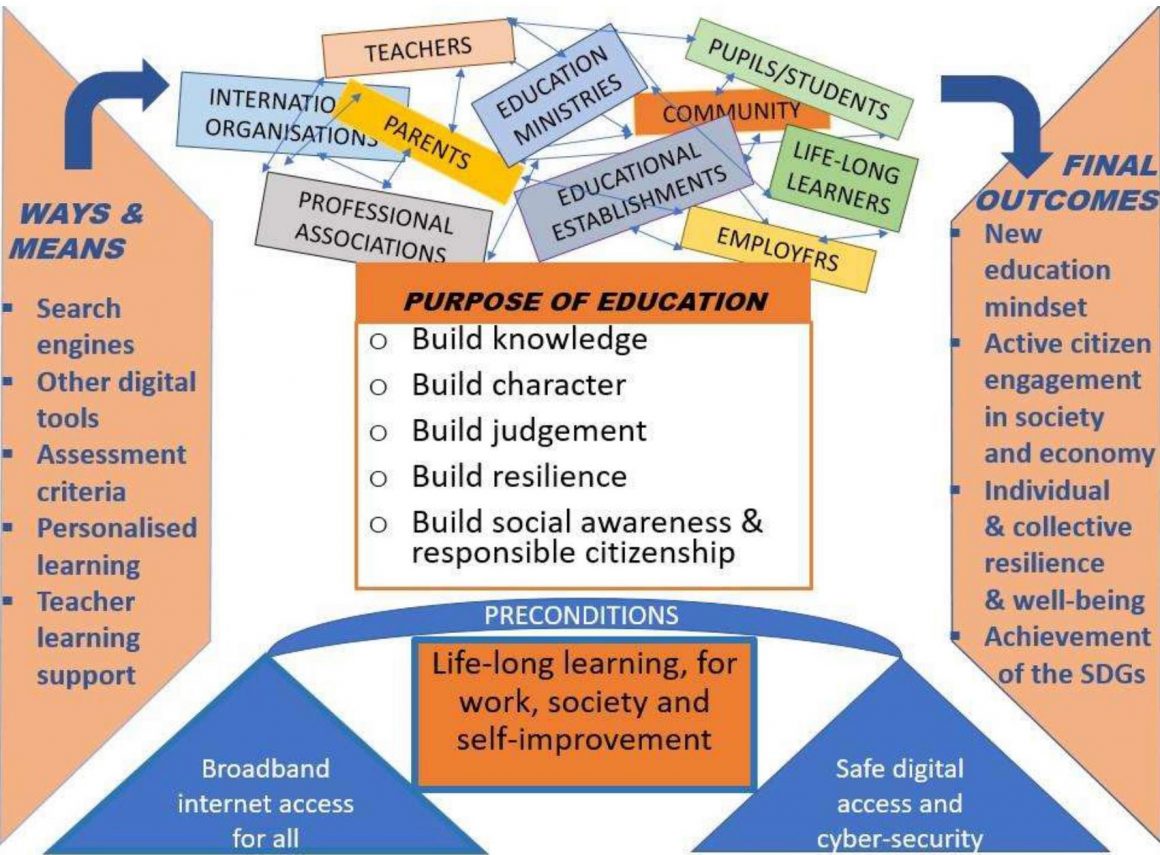Pandemic-related lockdowns have had devastating effects on education systems around the globe. Overnight, everyone was required to go digital, exposing the gap between our fast-changing and increasingly digital world and the infrastructure under which education is delivered. While this issue is not new, the pandemic has emphasized its urgency. The need to transform educational systems transcends integrating digital tools. In a rapidly changing world, a change in mindset is needed regarding education at large in order to prepare learners for the future. This transformation can be done now, in an efficient, effective and inclusive manner, because the necessary know-how and technologies are already here.
COVIDEA’s overall aim is to propel education systems into the future, thus ensuring the resilience and well-being of learners and societies around the world.
The COVIDEA initiative was launched by FOGGS, the Foundation for Global Governance and Sustainability and P4TT, the Platform for Transformative Technologies, with the support of the International Science Council in early 2020. The initiative aspires to build on the opportunities new technologies offer, as well as on the latest advances in education and related sciences, with a view to contributing to the achievement of the Sustainable Development Goals (SDGs). COVIDEA directly addresses SDG 4: To ensure inclusive and equitable quality education and promote lifelong learning opportunities for all. The proposed realignment of education systems would play a key role in achieving all the SDGs, as their achievement begins with raising a new generation of individuals who are resilient and adaptable to change. The purpose of education as we see it is multi-fold: to build technical knowledge but also to build character, judgement, resilience, social awareness, and active citizenship. Educational curricula, from primary and secondary to tertiary and lifelong education, should be rethought and reorganized along these lines.
COVIDEA’s overall aim is to propel education systems into the future, thus ensuring the resilience and well-being of learners and societies around the world. The core team behind COVIDEA consists of experts in education, digital technology, sustainability and resilience. Together we are charting a new way forward in education, whereby technology will be utilized to bring together educators, parents, students, policymakers, and other relevant communities to address the shortcomings of the current education systems, which are amplified by the COVID crisis.
A key tool for the advancement of the COVIDEA approach is the Digital Education Agora. In ancient Greece, the Agora was a public space open for assemblies, public discourse, and goods exchange. The city-state’s greatest minds met in the Agora to socialize, discuss philosophy, politics and instruct pupils, thereby shaping culture and civic engagement. We have envisioned the Digital Education Agora as a virtual city in cyberspace that includes a Café, a Library, and a digital technologies demonstration place (“Digitarium”) at its center.
Eventually, we want universities, education ministries, international organizations, and other stakeholders to join and use the Agora as a meeting space and repository of good practices in education, including teaching content and pedagogies. We are also exploring possibilities to pilot test the COVIDEA approach in a number of countries, in conjunction with efforts made by the United Nations to reinforce Science, Technology, and Innovation roadmaps for achieving the Sustainable Development Goals.
If you are interested in learning more about COVIDEA, or in taking a role in bringing this initiative to fruition, please visit the COVIDEA webpage or contact us at info@foggs.org.
The COVIDEA Team – convened by FOGGS and P4TT
On the occasion of the International Day of Education, 24 January 2021



